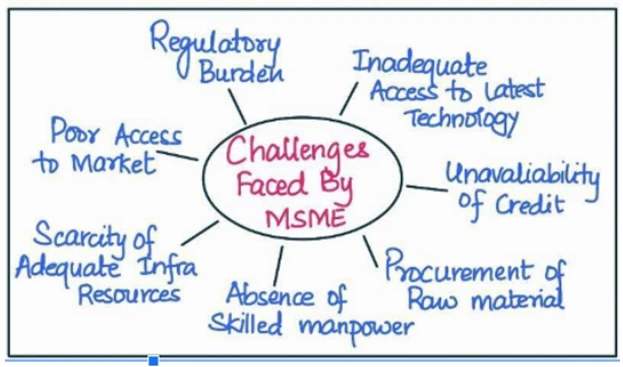Answer:
|
How to approach this question?
- Introduction
- Define MSMEs with examples and mention classification criteria.
- Body
- Write about their role in providing income or livelihood opportunities.
- Describe their contribution towards the fulfilment of SDGs.
- Discuss the challenges faced by MSMEs.
- Conclusion
- Provide a way forward in the conclusion.
|
Introduction
Micro, Small, and Medium Enterprises (MSMEs) are businesses with defined thresholds based on factors like investment and turnover. Though they contribute 27% in country’s GDP but their role extends beyond economic aspects as they actively contribute to the achievement of the Sustainable Development Goals (SDGs), which aim to promote a more inclusive and sustainable future.
MSME Classification:
- Micro – the investment in plant and machinery equipment will not be more than 1 crore, and annual turnovers will not be more than 5 crores.
- Small – the investment in plant and machinery equipment will not be more than 10 crores, and annual turnovers will not be more than 50 crores.
- Medium – As per the MSME classification criteria, the investment in plant and machinery equipment of Medium enterprises is not more than 20 crore, and the annual turnover is not more than 100 crore.
Body
Role of MSMEs in Providing Income or Livelihood Opportunities:
- Job Creation: MSMEs employ over 110 million people, making it the largest employment generator in the country.
- Entrepreneurship and Self-Employment: MSMEs empower individuals as entrepreneurs, with over 50,000 startups supported through the Startup India initiative, promoting self-employment.
- Economic Growth in Local Communities: MSMEs contribute around 30% to India’s GDP, driving economic growth, especially in rural and semi-urban areas.
- Skills Development and Training: MSMEs offer training opportunities to enhance employee skills and employability, aligning with the Skill India Mission.
- Supporting Supply Chains: MSMEs supply goods/services to larger industries, generating income and contributing to overall economic growth.
Role of MSMEs in the Fulfilment of SDGs:
- SDG-5 (Gender Equality): MSMEs empower women, promoting gender equality through economic opportunities and entrepreneurship. For instance, Women-led MSMEs in India have created approximately 8 million jobs.
- SDG-8 (Decent Work and Economic Growth): MSMEs create jobs and drive economic growth, contributing to poverty reduction and economic empowerment. MSMEs contribute around 29% of India’s GDP and employ more than 110 million people.
- SDG-9 (Industry, Innovation, and Infrastructure): MSMEs foster innovation, sustainable infrastructure, and economic diversification, accounting for over 80% of industrial enterprises and 45% of manufacturing output.
- SDG-11 (Sustainable Cities and Communities): MSMEs build sustainable urban communities by providing local goods/services, stimulating local economies, and enhancing social cohesion through job creation and economic support.
- SDG-12 (Responsible Consumption and Production): MSMEs promote responsible consumption and production through eco-friendly practices and sustainable products/services, focusing on waste reduction, energy efficiency, and sustainable sourcing. Example- The Coir Board and the Khadi and Village Industries Commission (KVIC), which leading the path of eco- friendly MSMEs.
Despite their great significance, MSMEs are facing the following challenges:
- Limited Access to Finance: MSMEs often struggle to access formal credit. 77% of MSMEs reported facing challenges in obtaining adequate credit.
- Lack of Infrastructure: Poor infrastructure, such as inadequate transportation, power supply, and digital connectivity, affects the productivity and efficiency of MSMEs.

- Skill Gaps: Only 4-5% of our workforce is formally trained. It creates the skill gap in MSMEs and overall industry sector.
- Regulatory Burden: such as a small restaurant spends significant time and effort navigating through various permits and licenses required by local authorities, diverting attention from core business operations.
- Technology Adoption: Many MSMEs in India still rely on traditional methods of production and have low technology adoption rates. The lack of technological upgradation hampers productivity and competitiveness in the global market.
- Market Access and export challenges: A study by the Ministry of MSMEs in 2019 found that only about 5% of Indian MSMEs were involved in export activities.
Way Forward:
- Facilitate technology upgradation by providing financial incentives, subsidies, and training programs to MSMEs.
- Strengthen skill development initiatives to create a skilled workforce aligned with industry requirements.
- Facilitate market linkages and export opportunities for MSMEs through trade fairs, exhibitions, and e-commerce platforms.
- Implement effective measures to address delayed payments to MSMEs. A robust online payment monitoring system can improve working capital management.
- Encourage the formation of MSME clusters to promote shared facilities, technology sharing, and collective bargaining power.
Conclusion:
Moving forward, empowering MSMEs through support, favorable policies, finance, innovation, and collaboration will enable them to fulfill the SDGs and contribute to the prosperity of society and contribute to overall economic growth and job creation in the country.
To get PDF version, Please click on "Print PDF" button.


Latest Comments